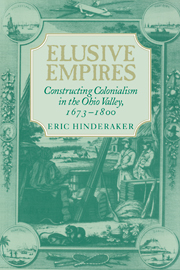PART TWO - EMPIRES OF LAND
Published online by Cambridge University Press: 16 February 2010
Summary
Empires are constructions of convenience, and the particular forms they take reflect the needs and desires of the people who constitute them. A “pure” mercantile empire would have had only very modest territorial requirements: garrisoned ports, perhaps established in conjunction with plantation colonies that might be relatively small and circumscribed; inland trading posts to serve as points of exchange. But a vital element of the European attraction to North America was the land itself, and more capacious development schemes emerged very rapidly. Alongside proto-modern visions of commercial exploitation and development, retro-feudal fantasies of vast landed estates became commonplace in seventeenth-century Europe. For a time America appeared to the nobles of England to be a place where the past glories of the great privileged families might be revived, where the steady erosion of noble status and influence might be reversed. In France, which had more successfully preserved noble prerogative, New World holdings still seemed suitable for extending aristocratic privileges overseas. As it turned out, nothing could have been more misconceived. The American colonies were too vast for their populations and resources to be carefully managed and controlled, the tie to Europe too tenuous to be closely bound. Rather than serving as bastions of social conservatism, they became hothouses of experimentation and change.
New France provides one kind of example of this pattern.
- Type
- Chapter
- Information
- Elusive EmpiresConstructing Colonialism in the Ohio Valley, 1673–1800, pp. 79 - 82Publisher: Cambridge University PressPrint publication year: 1997



